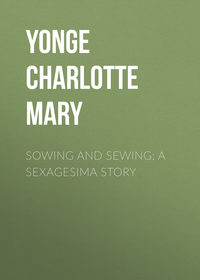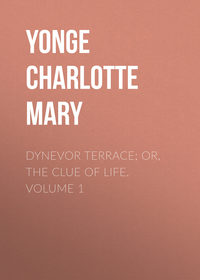
The Chaplet of Pearls
After parting with her aunt, Eustacie for a moment looked towards the chapel, then, clasping her hands, murmured to herself, ‘No! no! speed is my best hope;’ and at once mounted the stairs, and entered a room, where the large stone crucifix, a waxen Madonna, and the holy water font gave a cell-like aspect to the room; and a straw pallet covered with sackcloth was on the floor, a richly curtained couch driven into the rear, as unused.
She knelt for a moment before the Madonna; ‘Ave Maria, be with me and mine. Oh! blessed Lady, thou hadst to fly with thy Holy One from cruel men. Have thou pity on the fatherless!’
Then going to the door, she clapped her hands; and, as Veronique entered, she bade her shut and bolt the door, and at the same moment began in nervous haste to throw off her veil and unfasten her dress.
‘Make haste, Veronique. A dress of thine–’
‘All is known, then!’ cried Veronique, throwing up her arms.
‘No, but he is coming—Narcisse—to marry me at once—Marde-Gras—-’
‘Et quoi? Madame has but to speak the word, and it is impossible.’
‘And after what my aunt has said, I would die a thousand deaths ere speaking that word. I asked her, Veronique! She would have vengeance on the most guiltless—the most guiltless—do you hear?—of the Norman house. Never, never shall she have the chance! Come, thy striped petticoat!’
‘But, oh! what will Madame do? Where would she go? Oh! it is impossible.’
‘First to thy father’s. Yes, I know. He has once called it a madness to think of rallying my vassals to protect their lady. That was when he heard of it from thee—thou faint of heart—and thy mother. I shall speak to him in person now. Make haste, I tell thee, girl. I must be out of this place before I am watched or guarded,’ she added breathlessly. ‘I feel as if each moment I lost might have death upon it;’ and she looked about her like a startled deer.
‘To my father’s. Ah! there it is not so ill! But the twilights, the length of way,’ sobbed Veronique, in grievous distress and perplexity. ‘Oh! Madame, I cannot see you go. The Mother Abbess is good. She must have pity. Oh, trust to her!’
‘Trust! Did I not trust to my cousin Diane? Never! Nothing will kill me but remaining in their hands.’
Veronique argued and implored in vain. Ever since, in the height of those vehement austerities by which the bereaved and shattered sufferer strove to appease her wretchedness by the utmost endeavour to save her husband’s soul, the old foster-mother had made known to her that she might thus sacrifice another than herself. Eustacie’s elastic heart had begun to revive, with all its dauntless strength of will. What to her women seemed only a fear, was to her only a hope.
Frank and confiding as was her nature, however, the cruel deceptions already practiced on her by her own kindred, together with the harsh words with which the Abbess spoke of Berenger, had made her aware that no comfort must be looked for in that quarter. It was, after all, perhaps her won instinct, and the aunt’s want of sympathy, that withheld her from seeking counsel of any save Perrine and her daughter, at any rate till she could communicate with the kind young Queen. To her, then, Eustacie had written, entreating that a royal mandate would recall her in time to bestow herself in some trustworthy hands, or even in her husband’s won Norman castle, where his heir would be both safe and welcome. But time has passed—the whole space that she had reckoned as needful for the going and coming of her messenger—allowing for all the obstructions of winter roads—nay, he had come back; she knew letter was delivered, but answer there was none. It might yet come—perhaps a royal carriage and escort—and day after day had she waited and hoped, only tardily admitting the conviction that Elisabeth of Austria was as powerless as Eustacie de Ribaumont, and meantime revolving and proposing many a scheme that could only have entered the brain of a brave-spirited child as she was. To appeal to her vassals, garrison with them a ruinous old tower in the woods, and thence send for aid to the Montmorencys; to ride to Saumur, and claim the protection of the governor of the province; to make her way to the coast and sail for England; to start for Paris, and throw herself in person on the Queen’s protection,—all had occurred to her, and been discussed with her two confidantes; but the hope of the Queen’s interference, together with the exceeding difficulty of acting, had hitherto prevented her from taking any steps, since no suspicion had arisen in the minds of those about her. Veronique, caring infinitely more for her mistress’s health and well-being than for the object of Eustacie’s anxieties, had always secretly trusted that delay would last till action was impossible, and that the discovery would be made, only without her being accused of treason. In the present stress of danger, she could but lament and entreat, for Eustacie’s resolution bore her down; and besides, as she said to herself, her Lady was after all going to her foster-father and mother, who would make her hear reason, and bring her back at once, and then there would be no anger nor disgrace incurred. The dark muddy length of walk would be the worst of it—and, bah! most likely Madame would be convinced by it, and return of her own accord.
So Veronique, though not intermitting her protests, adjusted her own dress upon her mistress,—short striped petticoat, black bodice, winged turban-like white cap, and a great muffling gray cloth cloak and hook over the head and shoulders—the costume in which Veronique was wont to run to her home in the twilight on various errands, chiefly to carry her mistress’s linen; for starching Eustacie’s plain bands and cuffs was Mere Perrine’s special pride. The wonted bundle, therefore, now contained a few garments, and the money and jewels, especially the chaplet of pearls, which Eustacie regarded as a trust.
Sobbing, and still protesting, Veronique, however, engaged that if her Lady succeeded in safely crossing the kitchen in the twilight, and in leaving the convent, she would keep the secret of her escape as long as possible, reporting her refusal to appear at supper, and making such excuses as might very probably prevent the discovery of her flight till next day.
‘And then,’ said Eustacie, ‘I will send for thee, either to Saumur or to the old tower! Adieu, dear Veronique, do not be frightened. Thou dost not know how glad I am that the time for doing something is come! To-morrow!’
‘To-morrow!’ thought Veronique, as she shut the door; ‘before that you will be back here again, my poor little Lady, trembling, weeping, in dire need of being comforted. But I will make up a good fire, and shake out the bed. I’ll let her have no more of that villainous palliasse. No, no, let her try her own way, and repent of it; then, when this matter is over, she will turn her mind to Chevalier Narcisse, and there will be no more languishing in this miserable hole.’
CHAPTER XVI. THE HEARTHS AND THICKETS OF THE BOCAGE
I winna spare for his tender age, Nor yet for his hie kin; But soon as ever he born is,He shall mount the gallow’s pin.—Fause Foodrage.Dusk was closing in, but lamps had not yet been lighted, when with a trembling, yet almost a bounding heart, Eustacie stole down the stone staircase, leading to a back-door—an utterly uncanonical appendage to a nunnery, but one much used among the domestic establishment of Bellaise.
A gleam of red light spread across the passage from the half-open kitchen door, whence issued the savoury steam of the supper preparing for Monseigneur. Eustacie had just cautiously traversed it, when the voice of the presiding lay-sister called out, ‘Veronique, is that you?’
‘Sister!’ returned Eustacie, with as much of the Angevin twang as she could assume.
‘Where are you going?’
‘To the Orchard Farm with this linen.’
‘Ah! it must be. But there are strict orders come from Madame about nobody going out unreported, and you may chance to find the door locked if you do not come back in good time. Oh! and I had well-night forgot; tell your mother to be here early to-morrow, Madame would speak with her.’
Eustacie assented, half stifled by the great throb of her fluttering heart at the sense that she had indeed seized the last moment. Forth then she stepped. How dark, waste, and lonely the open field looked! But her heart did not fail her; she could only feel that a captivity was over, and the most vague and terrible of her anxieties soothed, as she made her way into one of the long shady lanes of the Bocage. It was nearly dark, and very muddy, but she had all the familiarity of a native with the way, and the farm, where she had trotted about in her infancy like a peasant’s child, always seemed like home to her. It had been a prime treat to visit it during her time of education at the convent, and there was an association of pleasure in treading the path that seemed to bear her up, and give her enjoyment in the mere adventure and feeling of escape and liberty. She had no fear of the dark, nor of the distant barking of dogs, but the mire was deep, and it was plodding work in those heavy sabots, up the lane that led from the convent; and the poor child was sorely weary long before she came to the top of the low hill that she used scarcely to know to be rising round at all. The stars had come out; and as she sat for a few moments to rest on a large stone, she saw the lights of the cottage fires in the village below, and looking round could also see the many gleams in the convent windows, the read fire-light in her own room among them. She shivered a little as she thought of its glowing comfort, but turned her back resolutely, tightened her cloak over her head, looked up to a glimmer in the watch-tower of her own castle far above her on the hill and closed against her; and then smiled to herself with hope at the sparkle of a window in a lonely farmhouse among the fields.
With fresh vigour she rose, and found her way through lane and field-path to the paddock where she had so often played. Here a couple of huge dogs dashed forward with an explosion of barks, dying away into low growls as she spoke to them by their names, and called aloud on ‘Blaise!’ and ‘Mere Perrine!’ The cottage door was opened, the light streamed forth, and a man’s head in a broad had appeared. ‘Veronique, girl, is this an hour to be gadding abroad?’
‘Blaise, do you not know me?’
‘It is our Lady. Ah!’
The next moment the wanderer was seated in the ample wooden chair of the head of the family, the farmer and his two stout sons standing before her as their liege Lady, and Mere Perrine hanging over her, in great anxiety, not wholly dispelled by her low girlish laugh, partly of exultation at her successful evasion, partly of amusement at their wonder, and partly, too, because it was so natural to her to enjoy herself at that hearth that she could not help it. A savoury mess from the great caldron that was for ever stewing over the fire was at once fished out for her, before she was allowed to explain herself; and as she ate with the carved spoon and from the earthenware crock that had been called Mademoiselle’s ever since her baby-days, Perrine chafed and warmed her feet, fondled her, and assured her, as if she were still their spoiled child, that they would do all she wished.
Pierre and Tiennot, the two sons, were sent out to fodder the cattle, and keep careful watch for any sounds of pursuers from the convent; and Blaise, in the plenitude of his respects and deference, would have followed them, but Eustacie desired him to remain to give her counsel.
Her first inquire was after the watch-tower. She did not care for any discomfort if her vassals would be faithful, and hold it out for her, till she could send for help to the allies of her husband’s house, and her eyes glanced as she spoke.
But Blaise shook his head. He had looked at the tower as Madame bade, but it was all in ruins, crumbling away, and, moreover, M. le Chevalier had put a forester there—a grim, bad subject, who had been in the Italian wars, and cared neither for saint nor devil, except Chevalier Narcisse. Indeed, even if he had not been there, the place was untenable, it would only be getting into a trap.
‘Count Hebert held it out for twelve days against the English!’ said Eustacie, proudly.
‘Ah! ah! but there were none of your falconets, or what call you those cannons then. No; if Madame would present herself as a choice morsel for Monsieur le Chevalier to snap up, that is the place.’
Then came the other plan of getting an escort of the peasants together, and riding with them towards the Huguenot territories around La Rochelle, where, for her husband’s sake, Eustacie could hardly fail to obtain friends. It was the more practicable expedient, but Blaise groaned over it, wondered how many of the farmers could be trusted, or brought together, and finally expressed his intention of going to consult Martin, his staunch friend, at the next farm. Meantime, Madame had better lie down and sleep. And Madame did sleep, in Perrine’s huge box-bedstead, with a sweet, calm, childlike slumber, whilst her nurse sat watching her with eyes full of tears of pity and distress; the poor young thing’s buoyant hopefulness and absence of all fear seemed to the old woman especially sad, and like a sort of want of comprehension of the full peril in which she stood.
Not till near dawn was Eustacie startled from her rest by approaching steps. ‘Nurse, is all ready?’ she cried. ‘Can we set off? Are the horses there?’
‘No, my child; it is but my good man and Martin who would speak with you. Do not hasten. There is nothing amiss as yet.’
‘Oh, nurse,’ cried Eustacie, as she quickly arranged the dress in which she had lain down, ‘the dear old farm always makes me sleep well. This is the first time I have had no dream of the whirling wheel and fiery gates! Oh, is it a token that HE is indeed at rest? I am so well, so strong. I can ride anywhere now. Let them come in and tell me.’
Martin was a younger, brisker, cleverer man than Blaise, and besides being a vassal of the young Lady, was a sort of agent to whom the Abbess instructed many of the matters of husbandry regarding the convent lands. He stood, like Blaise, bareheaded as he talked to little Lady, and heard her somewhat peremptorily demand why they had not brought the horses and men for her escort.
It was impossible that night, explained Martin. Time was needed to bring in the farm-horses, and summon the other peasants, without whom the roads were unsafe in these times of disorder. He and Blaise must go round and warn them to be ready. A man could not be ready in a wink of the eye, as Madame seemed to think, and the two peasants looked impenetrable in stolidity.
‘Laggards that you are!’ cried Eustacie, petulantly, clasping her hands; ‘and meantime all will be lost. They will be upon me!’
‘Not so, Madame. It is therefore that I came here,’ said Martin, deferentially, to the little fuming impatient creature; ‘Madame will be far safer close at hand while the pursuit and search are going on. But she must not stay here. This farm is the first place they will come to, while they will never suspect mine, and my good woman Lucette will be proud to keep watch for her. Madame knows that the place is full of shrubs and thickets, where one half of an army might spend a fine day in looking for the other.’
‘And at night you will get together the men and convoy me?’ asked Eustacie, eagerly.
‘All in good time, Madame. Now she must be off, ere the holy mothers be astir. I have brought an ass for her to ride.’
Eustacie had no choice but compliance. None of the Orchard family could go with her, as it was needful that they should stay at home and appear as unconcerned as possible; but they promised to meet her at the hour and place to be appointed, ad if possible to bring Veronique.
Eating a piece of rye-bread as she went, Eustacie, in her gray cloak, rode under Martin’s guardianship along the deep lanes, just budding with spring, in the chill dewiness before sunrise. She was silent, and just a little sullen, for she had found stout shrewd Martin less easy to talk over than the admiring Blaise, and her spirit was excessively chafed by the tardiness of her retainers. But the sun rose and cleared away all clouds of temper, the cocks crew, the sheep bleated, and fresh morning sounds met her ear, and seemed to cheer and fill her with hope; and in some compunction for her want of graciousness, she thanked Martin, and praised his ass with a pretty cordiality that would have fully compensated for her displeasure, even if the honest man had been sensible of it.
He halted under the lee of a barn, and gave a low whistle. At the sound, Lucette, a brown, sturdy young woman with a red handkerchief over her head, and another over her shoulders, came running round the corner of the barn, and whispered eagerly under her breath, ‘Ah! Madame, Madame, what an honour!’ kissing Eustacie’s hand with all her might as she spoke; ‘but, alas! I fear Madame cannot come into the house. The questing Brother Francois—plague upon him!—has taken it into his head to drop in to breakfast. I longed to give him the cold shoulder, but it might have brought suspicion down.’
‘Right, good woman,’ said Martin; ‘but what shall Madame do? It is broad way, and no longer safe to run the lanes!’
‘Give me a distaff,’ said Eustacie, rising to the occasion; ‘I will go to that bushy field, and herd the cows.’
Madame was right, the husband and wife unwillingly agreed. There, in her peasant dress, in the remote field, sloping up into a thick wood, she was unlikely to attract attention; and though the field was bordered on one side by the lane leading to the road to Paris, it was separated from it by a steep bank, crowned by one of the thick hedgerows characteristic of the Bocage.
Here, then, they were forced to leave her, seated on a stone beneath a thorn-bush, distaff in hand, with bread, cheese, and a pitcher of milk for her provisions, and three or four cows grazing before her. From the higher ground below the wood of ash and hazel, she could see the undulating fields and orchards, a few houses, and that inhospitable castle of her own.
She had spent many a drearier day in the convent than this, in the free sun and air, with the feeling of liberty, and unbounded hopes founded on this first success. She told her beads diligently, trusting that the tale of devotions for her husband’s spirit would be equally made up in the field as in the church, and intently all day were her ears and eyes on the alert. Once Lucette visited her, to bring her a basin of porridge, and to tell her that all the world at the convent was in confusion, that messengers had been sent out in all directions, and that M. le Chevalier had ridden out himself in pursuit; but they should soon hear all about it, for Martin was pretending to be amongst the busiest, and he would know how to turn them away. Again, much later in the day, Martin came striding across the field, and had just reached her, as she sat in the hedgerow, when the great dog who followed him pricked his ears, and a tramping and jingling was audible in the distance in the lane. Eustacie held up her finger, her eyes dilating.
‘It must be M. le Chevalier returning. Madame must wait a little longer. I must be at home, or they may send out to seek me here, and that would be ruin. I will return as soon as it is safe, if Madame will hide herself in the hedgerow.’
Into the hedgerow accordingly crept Eustacie, cowering close to a holly-tree at the very summit of the bank, and led by a strange fascination to choose a spot where, unseen herself, she could gaze down on the party who came clanking along the hollow road beneath. Nearer, nearer, they came; and she shuddered with more of passion than of fear, as she beheld, not only her uncle in his best well-preserved green suit, but Narcisse, muddy with riding, though in his court braveries. Suddenly they came to a halt close beneath her! Was she detected? Ah! just below was the spot where the road to the convent parted from the road to the farm; and, as Martin had apprehended, they were stopping for him. The Chevalier ordered one of the armed men behind him to ride up to the farm and summon Martin to speak with him; and then he and his son, while waiting under the holly-bush, continued their conversation.
‘So that is the state of things! A fine overthrow!’ quoth Narcisse.
‘Bah! not at all. She will soon be in our hands again. I have spoken with, or written to, every governor of the cities she must pass through, and not one will abet the little runaway. At the first barrier she is ours.’
‘Et puis?’
‘Oh, we shall have her mild as a sheep.’ (Eustacie set her teeth.) ‘Every one will be in the same story, that her marriage was a nullity; she cannot choose but believe, and can only be thankful that we overlook the escapade and rehabilitate her.’
‘Thank you, my good uncle,’ almost uttered his unseen auditor.
‘Well! There is too much land down here to throw away; but the affair has become horribly complicated and distasteful.’
‘No such thing. All the easier. She can no longer play the spotless saint—get weak-minded priests on her side—be all for strict convents. No, no; her time for that is past! Shut her up with trustworthy persons from whom she will hear nothing from without, and she will understand her case. The child? It will scarce be born alive, or at any rate she need not know whether it is. Then, with no resource, no hope, what can she do but be too thankful for pardon, and as glad to conceal the past as we could wish?’
Eustacie clenched her fist. Had a pistol been within her reach, the speaker’s tenure of life had been short! She was no chastened, self-restrained, forgiving saint, the poor little thing, only a hot-tempered, generous, keenly-sensitive being, well-nigh a child in years and in impulses, though with the instincts of a mother awakening within her, and of a mother who heard the life of her unborn babe plotted against. She was absolutely forced to hold her lips together, to repress the sobbing scream of fury that came to her throat; and the struggles with her gasping breath, the surging of the blood in her ears, hindered her from hearing or seeing anything for some seconds, though she kept her station. By the time her perceptions had cleared themselves, Martin, cap in hand, was in the lane below, listening deferentially to the two gentlemen, who were assuring him that inquiry had been made, and a guard carefully set at the fugitive could have passed those, or be able to do so. She must certainly be hidden somewhere near home, and Martin had better warn all his friends against hiding her, unless they wished to be hung up on the thresholds of their burning farm-steads. Martin bowed, and thought the fellows would know their own interest and Mademoiselle’s better.
‘Well,’ said the Chevalier, ‘we must begin without loss of time. My son has brought down a set of fellows here, who are trained to ferret out heretics. Not a runaway weasel cold escape them! We will set them on as soon as ever they have taken a bit of supper up there at the Chateau; and do you come up with us just to show them the way across to Leonard’s. That’s no unlikely place for her to lurk in, as you said this morning, good fellow.’
It was the most remote farm from that of Martin, and Eustacie felt how great were his services, even while she flushed with anger to hear him speaking of her as Mademoiselle. He was promising to follow immediately to the castle, to meet ces Messieurs there almost as soon as they could arrive, but excusing himself from accompanying them, by the need of driving home the big bull, whom no one else could manage.
They consented, and rode on. Martin watched them out of sight, then sprang up by some stepping-stones in the bank, a little below where Eustacie sat, and came crackling through the boughs to where she was crouching down, with fierce glittering eyes and panting breath, like a wild animal ready to spring.
‘Madame has heard,’ said Martin, under his breath.
‘If I have heard! Oh that I were a man, to slay them where they stood! Martin, Martin! you will not betray me. Some day WE will reward you.’
‘Madame need not have said THAT to me,’ said Martin, rather hurt. ‘I am only thinking what she can do. Alas! I fear that she must remain in this covert till it is dark, for these men’s eyes are all on the alert. At dark, I or Lucette will come and find a shelter for her for the night.’









